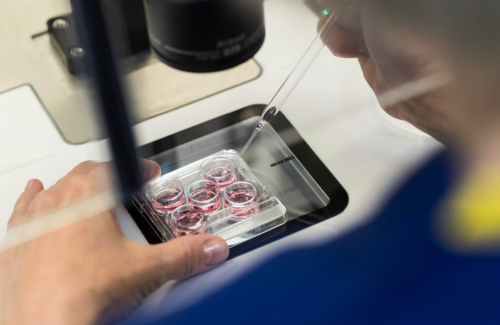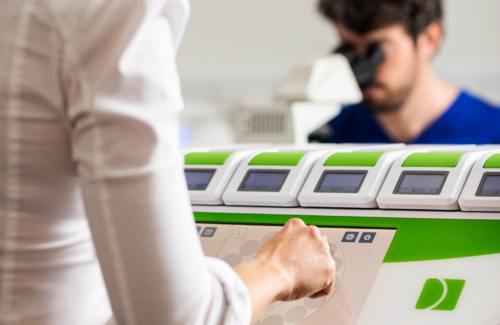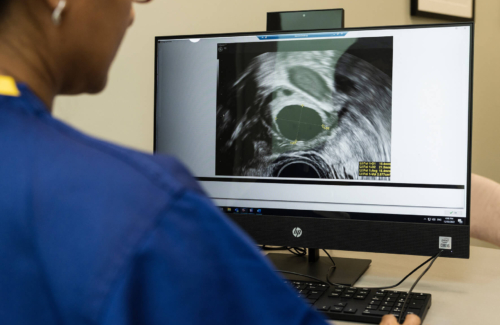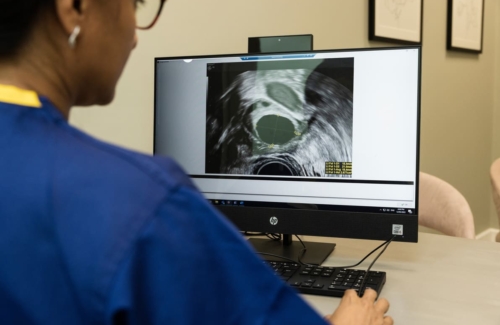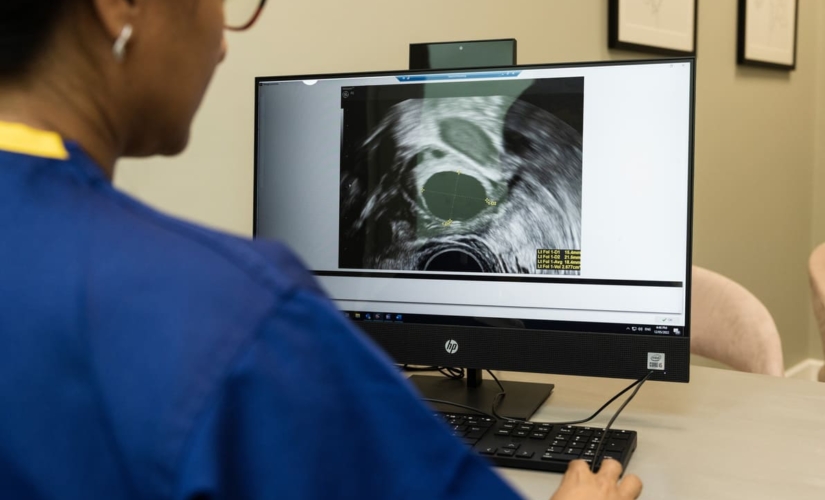PCOS Supporting you with PCOS
We specialise in the timely diagnosis, management and treatment of polycystic ovaries. Our expert doctors will create an individualised treatment plan for you to relieve symptoms and minimise the impact PCOS is having on both your everyday life and fertility.
What is PCOS?
Polycystic ovary syndrome (PCOS) affects how a woman’s ovaries function. It is one of the most frequent causes of female infertility.
If a woman has PCOS, this means she has ovaries containing a large sum of tiny cysts triggered by an imbalance of reproductive hormones. These harmless follicles, or underdeveloped sacs, are up to 8mm in size and are filled with fluid where eggs develop. PCOS prevents the sacs from releasing the eggs, subsequently preventing ovulation.
Although there is no cure for PCOS the health condition is treatable leading to an increased chance of conceiving.
PCOS Symptoms
PCOS affects around 1 in 10 women of childbearing age; half of which don’t have any symptoms. It’s important to diagnose PCOS as soon as possible to minimise polycystic ovaries symptoms and prevent long-term infertility.
PCOS symptoms vary but can include:
- Difficulty falling pregnant due to irregular ovulation or not ovulating at all
- Dark, thick patches of skin on the neck, arms, breasts or thighs.
- Excessive hair growth on the face and body
- Irregular periods or absent periods
- Weight gain on the waistline
- Oily skin or acne
- Thinning hair on the scalp
- Pelvic tenderness
- Ovarian cysts
- Sleep apnoea
Diagnosing PCOS
To diagnose PCOS, we undertake a full review of your history and symptoms before carrying out tests and procedures to determine if you have PCOS.
An early diagnosis alongside treatment is important as it will minimise symptoms and may reduce the risk of long-term problems such as type 2 diabetes, heart disease and long-term infertility.
Tests may include:
- Pelvic examination – a gynaecologist will visually and manually inspect reproductive organs for abnormalities
- Ultrasound – checking the ovary’s appearance paying particular attention to the thickness of the uterus lining
- Blood tests – to measure hormone levels, glucose tolerance and more
- Laparoscopy
- MRI scan
Treating PCOS
If PCOS is left untreated this can lead to long-term infertility therefore more specialist PCOS treatment will be required to enable a woman to have a baby.
Once we have diagnosed PCOS, we will design an individualised treatment and management plan. Your doctor will discuss your options and our experienced care teams will be on hand to provide sensitive support and aftercare.
Lifestyle changes such as maintaining a healthy weight also helps women with PCOS by reducing insulin and androgen levels, which in turn may restore ovulation.
For more information on how weight affects fertility read our full article here.
If you’re not trying to conceive with PCOS, or you’ve finished your fertility journey, looking after yourself when you have PCOS is equally as important as when trying to get pregnant. Our consultants are happy to meet with you, help you understand the condition more and what to do about it to help your long-term health.
Getting pregnant with PCOS
If you have been trying to conceive naturally for over a year, we recommend you speak to your doctor or a fertility specialist. Up to 50 percent of women do not get diagnosed for PCOS due to the symptoms being mistaken for normal bodily functions.
There are a variety of PCOS treatments to help a woman conceive a baby; medical and lifestyle-related. An option may be IVF – a successful fertility treatment known for helping women with polycystic ovaries.
Pregnancy with polycystic ovaries
Reaching a healthy weight will not only help a woman fall pregnant but it will help with pregnancy, as PCOS is still an issue once a woman has conceived, causing risk of complications during the first trimester of pregnancy, labour and delivery.
Being overweight can increase the chances of miscarriage and gestational diabetes, however, following the correct diet and exercise regime, alongside any medication prescribed by a medical professional, you will be able to manage PCOS during pregnancy.
How The Evewell can help
Here at The Evewell, not only are our fertility consultants also gynaecologists, with specialised interests in providing holistic female healthcare, but we are also leading the way in new endoscopic techniques for the treatment of ovarian cysts.
We offer a comprehensive and state-of-the-art fertility service enabling us to design an individualised care plan to reduce the effects of PCOS. Our team of experts have a wealth of experience in PCOS treatment, for women who desire to become pregnant now and in the future. With timely diagnosis and the option of being referred to our fertility counsellor for support The Evewell creates a sensitive and supportive environment throughout your fertility journey.
